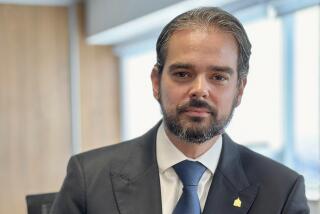UNESCO Board Names New Chief : Spaniard Wins After M’Bow Withdraws, Citing ‘Pressure’
- Share via
PARIS — After 10 days of inconclusive balloting and byzantine political maneuvering, Amadou Mahtar M’Bow, of Senegal, on Saturday night withdrew his bid for election to a third term as head of the troubled U.N. Educational, Scientific and Cultural Organization.
The withdrawal cleared the way for selection early today of Federico Mayor Zaragoza of Spain, a Western-backed biochemist and former education minister, as the organization’s new director general at a salary of $170,000 a year. Mayor won 30 votes from the 50-member executive board following 11 hours of heated debate. The vote must now be approved by a full meeting of UNESCO’s 150 members next month.
In a letter to the executive board announcing his decision to withdraw, M’Bow said he was quitting to “safeguard . . . intellectual cooperation free from all prejudice among free and sovereign peoples . . . and all pretentions by one category of member state to superiority over others.”
He charged that certain circles had used the election to “return to the methods of blackmail, disinformation and also pressure of all sorts.” The accusation was a reference to a threat by some member states to quit if M’Bow were reelected.
African backers of M’Bow, 66, insisted on a debate and vote on acceptance of his letter of withdrawal. At the same time, the Pakistanis sought to reinstate the candidacy of their former foreign minister, Sahabzada Yaqub Khan, who withdrew from the contest after the second round of balloting Oct. 9.
Western delegates, who consistently opposed M’Bow, argued for an immediate decision in favor of Mayor and contended that Khan could not re-enter the race because the rules stipulate that a fifth and final ballot must be a runoff between the two candidates who were leading on the fourth round of voting. Khan’s supporters argued that M’Bow’s withdrawal changed that.
Mayor’s election brings to a close a 13-year rule by M’Bow, which has brought UNESCO close to breaking up.
On the eve of the final selection meeting, both West Germany and Switzerland had publicly declared they would leave the organization if M’Bow were reelected. Japan, the Netherlands and Canada were prepared to follow suit.
The United States withdrew from UNESCO in 1984 because of what it called wasteful management, autocratic favoritism and nepotism on the part of M’Bow and a strong anti-Western bias in his leadership of the organization. Washington criticized his long and relentless campaign for an international agreement on a “new information order,” which looked to the West like little more than an abridgment of freedom of the press in conformity with Marxist-Leninist doctrine.
Britain and Singapore also quit UNESCO in 1985, and these withdrawals had cost the organization about one-third of its budget contributions.
Nevertheless, M’Bow persisted in maneuvering, with strong African support, to try to obtain a third term. On the first of five ballots by the executive board held on Oct. 7, he emerged as the front-runner, polling 18 votes against 16 for Pakistan’s Khan. Mayor barely kept in the contest with six votes on the first round.
On the second ballot Oct. 8, M’Bow continued to hold 18 votes while Khan slipped back to 12--after which Khan announced that he was withdrawing “for Afro-Asian solidarity.” At this point, the French announced that they would shift their vote to M’Bow, apparently out of concern for their relations with Senegal, one of France’s former African colonies. This caused considerable dismay among France’s partners in the European Communities--Spain in particular--but it looked as if it were all over.
M’Bow then polled 23 votes on the third ballot Oct. 13, but he was still tantalizingly short of the 26-vote majority needed to win in the executive board.
Meanwhile, the Soviet Union was holding four votes in line behind a Bulgarian nominee, Nikolai Todorov. Mayor, however, was coming up fast, picking up Khan voters who had not switched to M’Bow. On the fourth round of balloting last Wednesday, M’Bow dropped back to 21 votes, Mayor rose to 19 and the Soviet Bloc now held the balance with its four votes for Todorov.
The Soviet Union then began to pass word quietly that, after long years of supporting M’Bow and his anti-Western administration of UNESCO, they felt it was time for a change.
Before the final ballot was due to begin Friday, even the African bloc began to feel that the candidacy of their Senegalese colleague was an embarrassment and a potential disaster. The bloc asked for a postponement of the vote, which was granted.
Mayor, a native of Barcelona, is the first Spaniard to be named to a major U.N. post since Spain’s banishment from international organizations ended 11 years ago with the death of dictator Francisco Franco. Mayor knows UNESCO’s problems, having served in Paris as deputy director general of UNESCO in 1978-81 and then as a special adviser to M’Bow in 1983-84.
Even with Mayor’s election, it is unlikely that the United States will move to rejoin and resume its financial contribution to UNESCO until it sees practical evidence of a “new look” in the organization’s management. In an interview before the election for a new director general, Laura Genero, deputy assistant secretary of state for international organizations, said:
“We will consider rejoining only when there is evidence of fundamental institutional, programmatic and structural changes, de-politicalization of UNESCO’s programs and concentration on its original mandate to foster exchanges in science, education and culture.”
More to Read
Sign up for Essential California
The most important California stories and recommendations in your inbox every morning.
You may occasionally receive promotional content from the Los Angeles Times.










